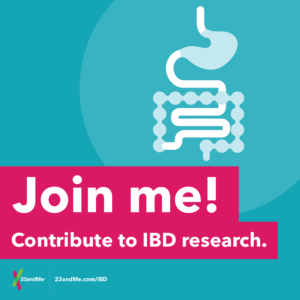In less than a year’s time, 23andMe is more than halfway to its goal of enrolling 10,000 patients in its study of  affect the condition.
affect the condition.
As we recognize World IBD Day May 19th, we wanted to update you on our progress in recruitment and share some of what we’ve learned from those who have already enrolled. We have also expanded our enrollment so that existing 23andMe customer diagnosed with IBD can join this study.
Learn more about how to enroll.
IBD is an umbrella diagnosis that includes Crohn’s disease and ulcerative colitis – two serious and chronic digestive diseases that affect about five million people worldwide.
With symptoms that can be both painful and embarrassing, the disease often leaves patients isolated and alone. World IBD Day is meant to raise awareness, offer solidarity among patients and advocate for more research to find a cure.
That’s just what 23andMe and Pfizer hope to do with the IBD study, teaming up to learn more about what genetics can teach about the progression of the disease and why certain medications work for some patients and not others.
We still have a lot of work to do but from our initial surveys, we’ve already learned a lot about what our participants have to deal with every day.
When participants join the study, they are asked to complete a short survey describing their symptoms and history with the conditions. We will soon ask participants to come back and fill out the survey again a few months down the line as a way to track any changes in their condition. This will allow researchers to learn how the disease progresses differently in different people.
For some participants, having IBD means almost constant discomfort, since about 30 percent reported they are either in pain all the time or most of the time. And for just over 10 percent of participants, the pain is ranked at a nine or 10 on a scale of zero to 10. While about a third of the participants have regular flare-ups – which might include digestive problems, stomach pain, joint pain, swelling, anemia or even eye pain – a quarter of participants said they haven’t had any issues in the last year.
We share all this mostly to convey some of the real struggles faced by those with IBD. Our IBD community is growing and we will continue to engage with participants by offering tips and updates. (Check out our IBD Travel Tips post here, for ideas on how to prep for your summer vacation if you suffer from IBD.)
In March, we hosted a Google hangout with the non-profit Crohn’s Journey Foundation founder, Sarah Choueiry. If you missed it, you can watch the video.
Stay tuned for more updates on our IBD research.